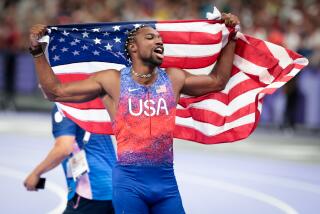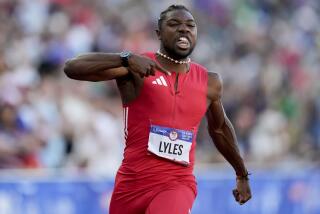THE SEOUL GAMES : Daley Thompson Lives for a Shot at His Third Gold Medal in Decathlon
- Share via
“If to win a gold medal in the 1980 Olympics I had to die in 1981 I’d do it,” Daley Thompson once said. “It means that much to me.”
Thompson won his Olympic gold in the decathlon in 1980, and lived to win another in 1984. In Seoul, the highly competitive Briton will try for an unprecedented third Olympic gold. But it won’t be easy.
“There’s no reason why I can’t win three Olympic decathlon titles,” he once said. “I’ll be just the right age (30 in July) for the decathlon.”
He may have miscalculated. Slowed by a persistent groin injury early in 1987, Thompson was upset last September in Rome and lost his world title to Torsten Voss of East Germany, the favorite in Seoul. Christian Plaziat of France and Sigi Wentz of West Germany could challenge Voss and deny Thompson any medal.
The question is, will Thompson physically be able to compete as well as he once did? His injury still bothered him this March, slowing him in a two-event (long jump, shot put) competition.
But Thompson, 6 feet 1, 187 pounds, won’t bow out without a struggle, and following him in Seoul should produce a look of one of the greatest athletes of any era reaching back near the end of his extraordinary career for one last major effort.
No one can doubt his determination -- he’s devoted merely his whole being to his sport.
“My life is totally given to training,” he wrote in the foreward to a biography, “The Subject Is Winning.” “All my efforts -- consciously and unconsciously, awake and sleeping -- are aimed at that. Anything that interferes becomes a problem.”
If that makes him sound like a dull fellow, he isn’t. Thompson likes a good time, although it has to fit into his training schedule. That doesn’t allow much time for frivolity: He works out up to eight hours a day, sometimes seven days a week. It’s the Daley grind.
“I enjoy what I’m doing as much as you would doing your favorite thing 24 hours a day,” he has said. “My office just happens to be a track.”
Thompson likes a laugh, and is known in Britain for his humor. “Thanks for a great games, America,” said the front of his T-shirt at the Los Angeles Olympics. The back read: “But what about the TV coverage?”
Certainly, Thompson hasn’t gotten the attention he’s due. He’s relatively little known in America. But he’s used to the small following attracted by the decathlon. When a fan promised to root for him at Los Angeles, he replied with a smile, “Well, that makes two of you, at least.”
Further, Thompson never has tried to cash in on his athletic achievements. One business agent quit pursuing Thompson in frustration. “I just want to be the best decathlete I can be,” he said. “The reason I’m doing this is to get the best out of myself.”
He avoids interviews as much as possible, and keeps out of crowds in England where he is a familiar face from photos in newspapers. What leisure he allows himself is spent evenings in front of the “telly,” or in a dark movie theater where no one will notice him. “The English language doesn’t have enough shades of meaning for the word ‘tired’ to describe how I might feel at the end of a day.”
Thompson loves to work out with other decathletes, even if he’ll meet up with them in competition. Gary Kinder, an assistant track coach at New Mexico who won the decathlon in the U.S. Olympic track and field trials in July, says he’s learned much from Thompson.
“The biggest thing I learned from Daley was not technique, but how to be (mentally) tough,” said Kinder, who barely shaded Abilene Christian’s Tim Bright in the Olympic trials. “He taught me what’s important and what’s not. He said when you go to a big meet, go to win, not to see how many points you can score.”
Born in London, Thompson is the son of a Nigerian father and Scottish mother. At 3, he was expelled from nursery school for fighting. At 7, he was shipped off to a boarding school. There, the headmaster got him interested in track and field. At 16, he met a coach who saw in him a combination of height, weight, strength, jumping ability and speed -- Thompson, the coach realized, was suited to the demands of the decathlon.
Derived from the Greek meaning “10 events,” the decathlon consists of, on the first day of competition, the 100-meter dash, long jump, shot put, high jump and 400-meter run; on the second day, the 110-meter hurdles, discus, pole vault, javelin and 1,500-meter run. Only one other athlete has won two Olympic decathlon gold medals: American Bob Mathias, in 1948 and 1952.
Initially, Thompson wasn’t so sure the decathlon was for him. In one of his early attempts at the pole vault, he sailed backward and crashed, suffering cuts and bruises. But within a year he had set a British junior record in the decathlon. In 1976 he made the British Olympic team and finished 18th at Montreal; the winner, Bruce Jenner, predicted that Thompson would be a future Olympic champion.
Thompson had won 10 straight decathlons before his defeat in Rome, where he finished an inglorious ninth. “There were many moments I felt like packing it in, but how could I?” he said later. “It was important I finished. I had to go through with it because there would have been people, particularly youngsters, looking to see what I did when the chips were down.”
Thompson takes exception to speculation that distractions from his recent marriage contributed to the defeat in Rome. He does admit that it was “upsetting” having to leave home to train in California last December, just after the birth of his daughter.
But Thompson insists that his defeat in Rome will spur him on at Seoul. No doubt, it will. But can he come back after his injury?
“I’ll be back and you won’t see me losing again,” he vowed after Rome, “because I enjoy the feeling of winning too much.”
More to Read
Go beyond the scoreboard
Get the latest on L.A.'s teams in the daily Sports Report newsletter.
You may occasionally receive promotional content from the Los Angeles Times.






